알판(면판)에 곡선 엣지를 적용하기 위해 트리머나 루터의 라운드 비트를 많이 사용하죠.
헌데 라운드 비트의 R값의 한계도 있고 또 너무 큰 R값의 라운드 비트는 오히려 위험할 수도 있습니다.
테이블쏘에 테이퍼 지그를 이용해 알판(면판)의 엣지를 주는 방법입니다.
Easy Table Saw Raised Panel
All raised panels are not created equally. With this simple technique, you can get this classic, coved door panel using a table saw.
테이블쏘로 알판(면판) 가공하기
제기된 모든 알판(면판)은 동일하게 생성되지 않습니다. 이 간단한 기술로 테이블쏘를 사용하여 이 고전적인 덮개 도어 알판(면판)을 얻을 수 있습니다.
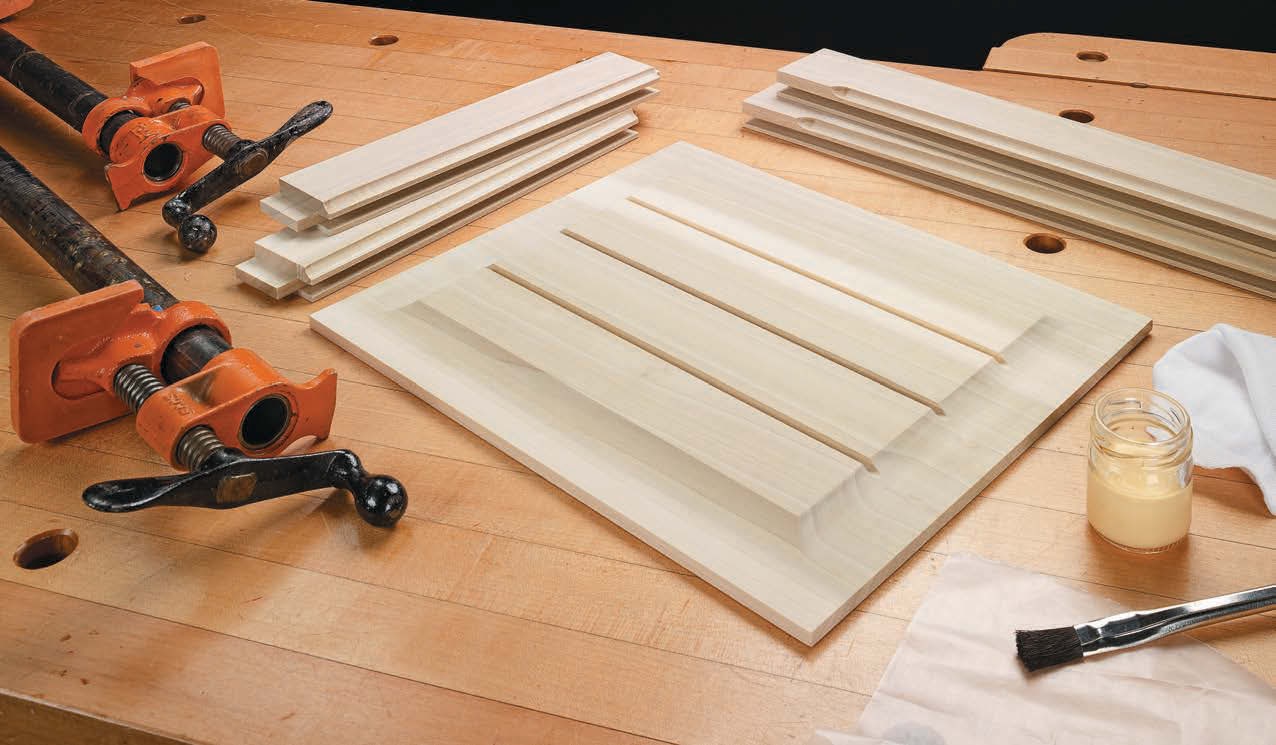
Making a raised panel door with a coved border around the field usually means working on the router table. But you can get this same custom look, without an expensive router bit, by using your table saw. All you’ll need is a simple shopmade, table saw jig and a few minutes of set up.
테두리가 오목한 알판(면판) 도어를 만드는 것은 일반적으로 루터 테이블에서 많이 작업합니다. 하지만 테이블 톱을 사용하면 비싼 루터 비트 없이도 동일한 모양을 만들 수 있습니다. 핸드메이드로 만든 테이블쏘 지그와 몇 분간의 설치만 하면 됩니다.
CURVE CUT. The technique for cutting the cove is definitely not a “straight cut” operation. The panel is pushed over the blade at an angle. If you take a look at the upper drawing on the opposite page you’ll see what I mean. The cove is made in multiple, light cuts. This causes the saw blade to “shave” wood off the length of the panel leaving an elliptical curve from the arc of your saw blade.
커브 컷. 곡선을 가공하는 기술은 "직선 절단" 작업이 아닙니다. 알판(면판)을 비스듬히 톱날 위로 지나가게 합니다. 아래 그림을 보면 무슨 말인지 알 수 있습니다. 곡선은 여러 개의 가벼운 컷으로 만들어집니다. 이로 인해 톱날이 알판(면판)의 목재를 "쉐이핑"하여 톱날의 호 만큼 타원형 곡선을 만듭니다.
SETUP. The setup shown in the drawings on these two pages, is specific to the raised panel used with this storage bench. But with adjustments, you can use this technique to cut any size cove on a variety of panel inserts.
설정. 아래 그림에 표시된 설정은 이 보관 벤치와 함께 사용되는 돌출 알판(면판)에만 해당됩니다. 그러나 조정을 통해 이 기술을 사용하여 다양한 알판(면판) 인서트에서 모든 크기의 곡선을 가공할 수 있습니다.

You begin by roughing out the cove on the edges of the panel. Then finish up by trimming off the outside edge of the cove with the panel held vertically to the blade. I used a flat-toothed rip blade to get a smoother cut on the cove.
The workpiece is guided by a fence clamped at an angle to the table saw blade. You can change the width and depth of the profile by changing the angle of the fence or the height of the blade. To find the angle for the panel, I used a parallelogram jig like the one shown above.
The arms of the jig are set to match the width of the cove on the panel. Once you’ve set up the jig, raise the saw blade to the final depth of the cove. Then mark the throat plate with masking tape where the teeth of the saw enter and exit the plate, as shown in the drawing.
Now lay the jig over the saw blade and line up the arms with the tape. Finally, mark a line on your table saw along the inside edge of the back arm. This line is for the fence placement. As you can see in the drawing, the fence is nothing more than a long, straight board. It’s clamped on the line as shown in the drawing.
먼저 알판(면판) 가장자리의 곡선를 가공합니다. 그런 다음 톱날에 수직으로 고정된 패널로 곡선의 바깥쪽 가장자리를 잘라내 마무리합니다. 나는 곡선을 더 부드럽게 만들기 위해 평평한 톱니가 있는 립 블레이드를 사용했습니다.
부재는 테이블쏘 톱날에 비스듬히 고정된 펜스를 따라 이동합니다. 펜스의 각도나 톱날의 높이를 변경하여 곡선의 너비와 깊이를 변경할 수 있습니다. 알판(면판)의 각도를 찾기 위해 위와 같은 평행사변형 지그를 사용했습니다.
지그의 암은 알판(면판)의 곡선 너비와 일치하도록 설정합니다. 지그를 설치했으면 톱날을 곡선의 최종 깊이까지 올립니다. 그런 다음 그림과 같이 톱날의 톱니가 베이스 판의 높이와 일치되는 부분에 마스킹 테이프로 표시합니다.
이제 톱날 위에 지그를 놓고 테이프로 맞춥니다. 마지막으로 톱날 후면 위치를 테이블쏘 베이스에 선을 표시합니다. 이 라인은 펜스 배치용입니다. 그림에서 볼 수 있듯이 펜스는 길고 곧은 판자에 불과합니다. 그림과 같이 선에 고정됩니다.
MULTIPLE CUTS. After the fence is in position, the rest is pretty simple. You’re going to cut the cove by removing small amounts of material in multiple passes. Lower the saw blade to take just 1 ⁄ 32 " off on the first pass. Use push blocks to keep the panel snug to the fence.
다중 절단. 펜스를 제 위치에 놓으면 나머지는 매우 간단합니다. 여러번 조금씩 톱날을 올려가며 곡선을 가공할 것입니다. 톱날을 낮추어 첫 번째 컷에서 1 ⁄ 32"만 떼어냅니다. 알판(면판)을 펜스에 꼭 밀착시키기 위해서는 푸시 블록은 사용하는 것이 좋습니다.
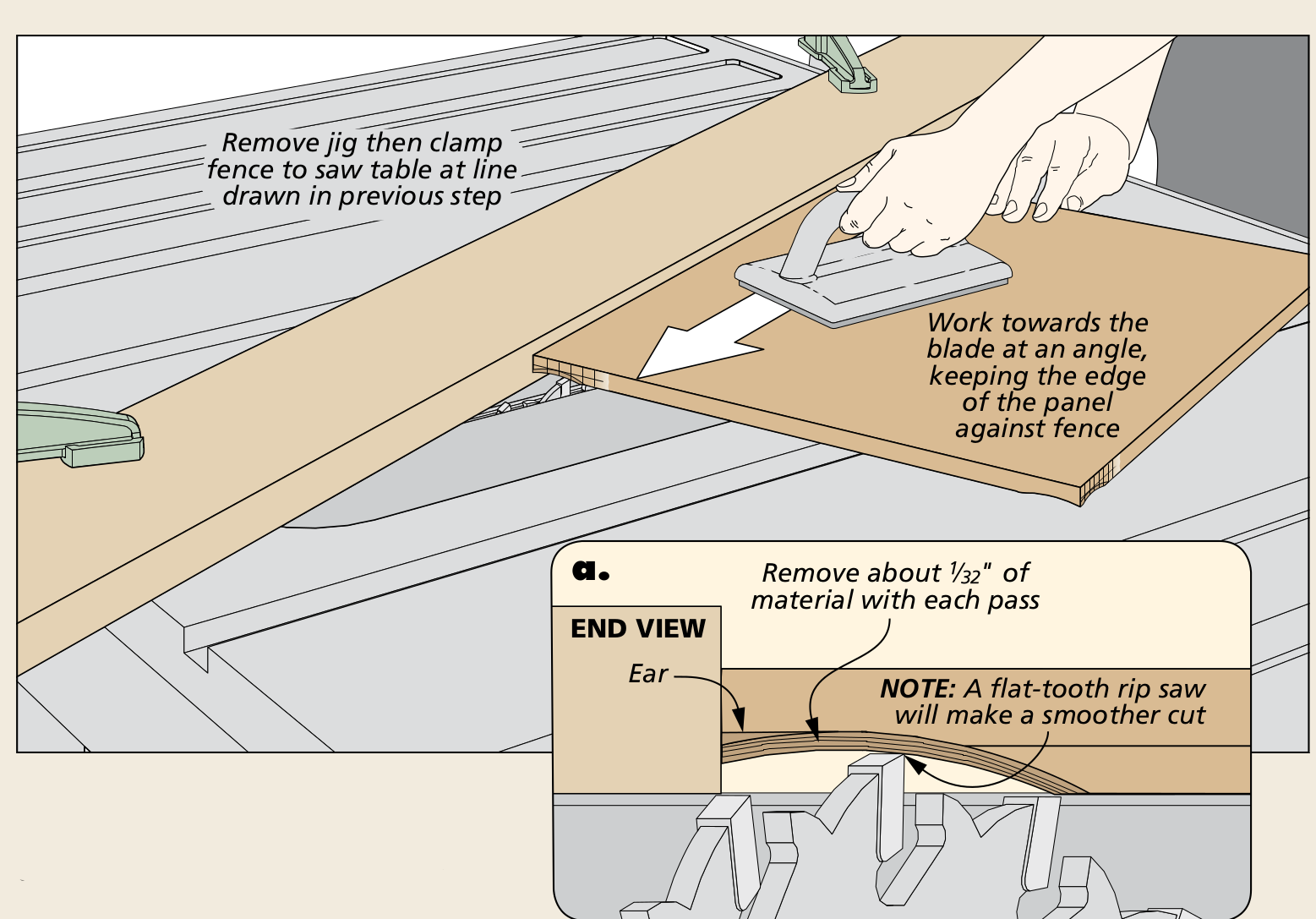
Since you’re cutting all four edges of the panel, make a pass on each edge. Then raise the blade just a hair (about 1 ⁄ 32 ") between passes. Your goal is to arrive at a cove depth that will allow the panel to fit in the groove in the frame with a little left for sanding the cove smooth. This will take some time to accomplish, so be patient.
알판(면판)의 네 면을 모두 자르기 때문에 각 면을 돌려가며 가공합니다. 그런 다음 톱날을 네 면 모두 가공하고 머리카락(약 1 ⁄ 32 ")만큼 올립니다. 목표는 곡선을 매끄럽게 가공하기 위해 약간의 여유를 두고 알판(면판)이 프레임의 홈에 들어갈 수 있는 곡선 깊이에 도달하는 것입니다. 완료하는 데 시간이 걸리므로 인내심을 가지십시오.
EAR. After you have the cove cut to the correct depth, you’ll notice a little “ear” on the outside edge of the panel. You remove this at the table saw using a tall auxiliary fence (box below). Simply stand the panel on edge with the fence set far enough from the blade to just nip the waste. Adjust the fence in to sneak up on the right distance. (Be careful not to set the fence too close or you’ll create a rabbet.) This final cut will also flatten the edge for a better fit in the door frame groove.
For a decorative touch, I added flutes on the panel face. You can rout these now. Since the flutes are routed with the grain there shouldn’t be any danger of tearout on the ends of the cuts.
The last step is to sand the cove to a smooth finish. You can shape a block from foamboard to hold the sandpaper. When the sanding is complete, you’ll have master ed a table saw technique. And you’ll have a panel that looks great.
귀. 코브를 올바른 깊이로 자른 후에는 알판(면판)의 바깥쪽 가장자리에 작은 "귀"가 있는 것을 알 수 있습니다. 테이블쏘 펜스(아래 상자)를 사용하여 수직으로 이것을 제거합니다. 펜스가 톱날에서 충분히 멀리 떨어진 상태에서 알판(면판)을 세우기만 하면 귀를 없앨 수 있습니다. 펜스를 조정하여 적절한 거리에서 몰래 올라갑니다. (펜스를 너무 가깝게 설정하지 않도록 주의하십시오. 그렇지 않으면 토끼가 생길 수 있습니다.) 이 최종 절단은 또한 도어 프레임 홈에 더 잘 맞도록 가장자리를 평평하게 합니다.
장식적인 터치를 위해 알판(면판) 면에 홈을 추가했습니다. 이제 라우팅할 수 있습니다. 플루트가 곡물과 함께 라우팅되기 때문에 절단 끝에서 찢어질 위험이 없어야 합니다.
마지막 단계는 곡선을 매끄럽게 마무리하는 것입니다. 폼보드로 블록을 만들어 사포를 고정할 수 있습니다. 샌딩이 완료되면 테이블쏘 기술을 마스터한 것입니다. 그리고 멋지게 보이는 알판(면판)을 갖게 될 것입니다.
How-To: Complete Panel Edge Profile
사용방법: 전체 알판(면판) 가장자리 엣지
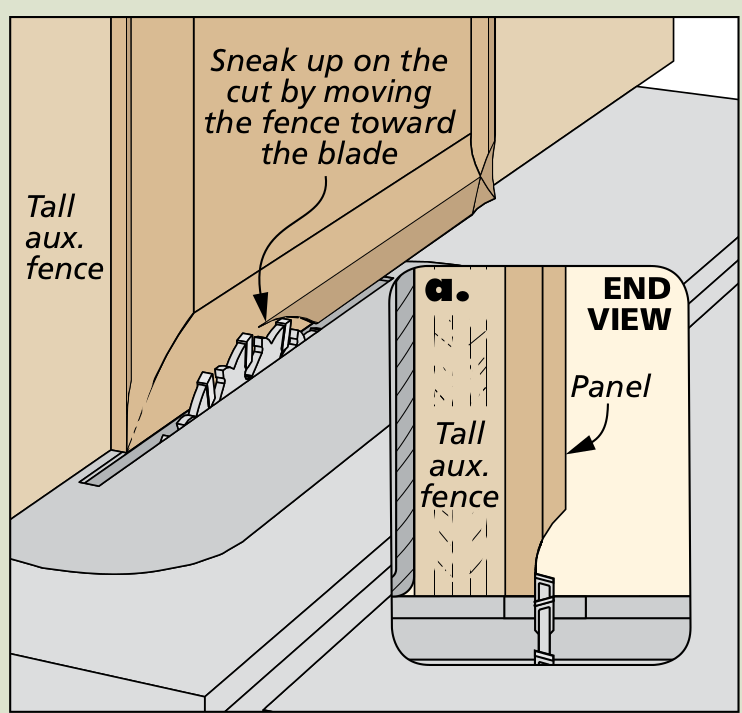
Trim the Edge. Shave off the small ear that appears after the cove is made by trimming it off on the table saw.
가장자리를 다듬습니다. 곡선이 만들어진 후에 나타나는 작은 귀를 테이블쏘에서 다듬습니다.
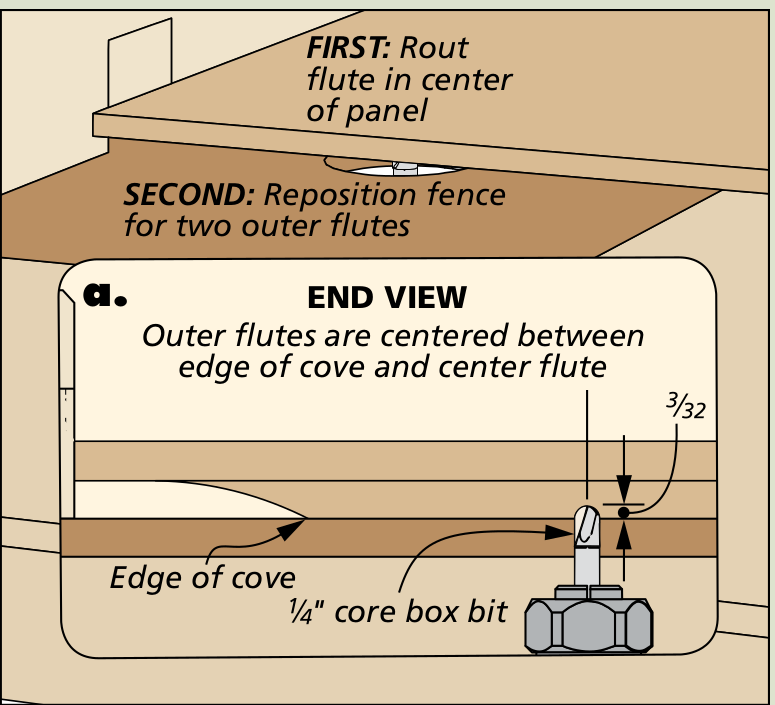
Flutes. Flutes are added on the router table with a core box bit, first in the center then on either side, as shown in the detail.
플루트. 플루트는 코어 박스 비트가 있는 루터 테이블에 추가되며 세부 사항에 표시된 것처럼 먼저 중앙에, 다음 양쪽에 추가됩니다.
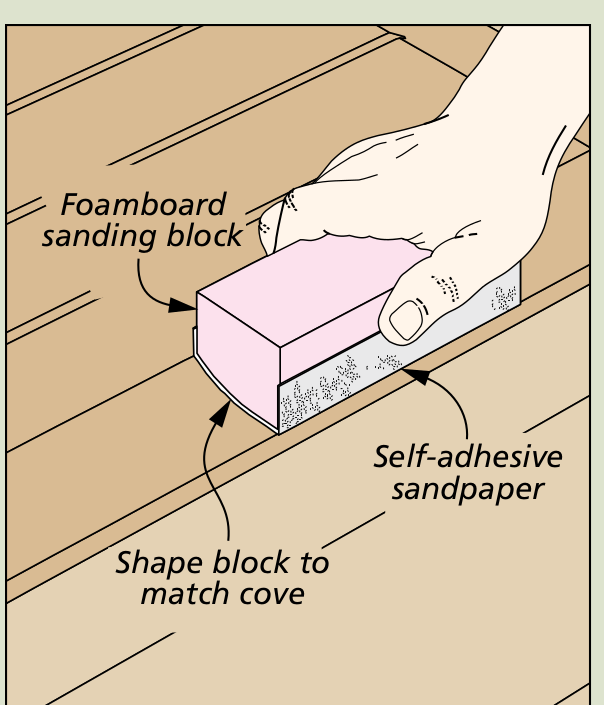
Smooth the Cove. A curved sanding block will keep the curve in shape as you sand it smooth.
곡선을 부드럽게 합니다. 곡선 샌딩 블록은 매끄럽게 샌딩할 때 곡선의 모양을 유지합니다.
 상감재 만들기
상감재 만들기
 테이블쏘 45도 연귀 지그
테이블쏘 45도 연귀 지그












